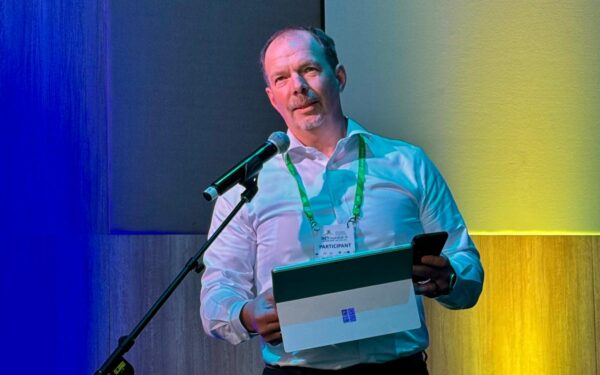Over the past few months, CIRA has been working with like-minded technical community organizations to raise our collective voice in ongoing United Nations’ dialogues about the future of internet governance.
As we’ve written previously, the multistakeholder model of internet governance is essential for ensuring that the internet we have continues to exist and work effectively. It allows everyone who has a stake in the internet’s future to engage in discussions and decisions on equal footing. If multistakeholder governance is weakened, then so is the internet.
To maintain the technical community’s seat at the table in shaping the internet’s future, it is vital that we collaborate and cooperate. We must share our perspectives, develop our understanding and argue for a shared vision that will help secure the future of multistakeholder internet governance.
That’s why, alongside our colleagues at auDA, InternetNZ and Nominet, we recently announced the formation of an informal coalition; its goal is to defend and improve the multistakeholder model of internet governance as a critical foundation of an open, free, global, secure, resilient and interoperable internet.
This week, “A Technical Community Coalition for Multistakeholderism” (TCCM), hits an important milestone as CIRA joins 13 other technical operators from across the globe in co-publishing a new Statement of Purpose that sets out why we are working together, and what we hope to achieve.
You can read the Statement, including the list of initial signatories, below.
We’d love to hear from you if you’re curious about TCCM or would like to get involved as a member of the internet’s technical community. Many of the first signatories will be at the upcoming ICANN meeting in Kigali, Rwanda—if you’d like to talk with us, please contact us to find out more.
A technical community coalition for multistakeholderism (TCCM)
We are members of the Internet’s technical community: the companies, organizations, groups and actors whose day-to-day job is to operate the critical infrastructure and services at the heart of the Internet.
A driver of innovation, progress and development, the Internet touches all aspects of human life. This transformative technology is governed through collaboration across varied overlapping stakeholders and processes—and involves the participation of distinct stakeholder groups: governments, civil society, academia, the private sector and the technical community. This form of collaborative governance or dialogue is called multistakeholderism.
The technological success of the Internet—the reason it works seamlessly across the globe—is the direct result of this multistakeholder approach and its use in various fora and initiatives. This approach enables stakeholders to come together on an equal footing to discuss or make decisions about the Internet and to foster its ongoing evolution and expansion.
Although imperfect, the multistakeholder approach fosters a level of diversity, accountability and transparency that cannot be replicated in intergovernmental environments alone. It also ensures that decision-making about the Internet and its governance isn’t led by individual nation-based political interests.
However, the multistakeholder approach is under threat. In a period of critical decision-making at the United Nations taking place across 2024 and 2025, there are risks that:
- the technical community and other key stakeholder groups will be left out of—or have their voices weakened in—dialogues related to the future of the Internet and its governance.
- in the absence of all relevant stakeholders, new concepts that inadvertently destabilize the multistakeholder model may be introduced.
- the mandate of the annual Internet Governance Forum, a key and enduring space for multistakeholder dialogue about the Internet, is not renewed or the Forum is weakened by the introduction of better-resourced, intergovernmental initiatives.
Taken together, if such risks materialize, the multistakeholder model of Internet governance would be weakened and decisions about the Internet’s operations would increasingly be made in intergovernmental or multilateral settings.
We the undersigned are committed to defending, evolving and strengthening multistakeholderism in decision-making and dialogues about the Internet. It is imperative that the people who manage the Internet’s operations are involved—on equal terms as governments and other stakeholders—in discussions, deliberations and decisions about the Internet’s future and its governance.
An evolved and strengthened multistakeholder approach is the best path forward to ensure that the Internet remains open, free, global, secure, resilient and interoperable—available to all.
Signatories as of 20 June 2024
(in alphabetical order)
Asia Pacific Network Information Centre (APNIC)
Associação DNS.PT, Portuguese Registry
au Domain Administration Ltd (auDA)
Blacknight
Canadian Internet Registration Authority (CIRA)
DENIC eG
DotAsia Organisation
GoDaddy
Identity Digital
IE Domain Registry CLG trading as .ie
InternetNZ
Japan Network Information Center (JPNIC)
Japan Registry Services Co., Ltd.
Network Information Center Costa Rica
Nominet UK
Public Interest Registry
Tucows, Inc
Byron Holland (MBA, ICD.D) is the president and CEO of the Canadian Internet Registration Authority (CIRA), the national not-for-profit best known for managing the .CA domain and developing new cybersecurity, DNS, and registry services.
Byron is an expert in internet governance and a seasoned entrepreneur. Under Byron’s leadership, CIRA has become one of the leading ccTLDs in the world, with over 3 million domains under management. Over the past decade, he has represented CIRA internationally and held numerous leadership positions within ICANN. He currently sits on the Board of Directors for TORIX, and is a member of the nominations committee for ARIN. He lives in Ottawa with his wife, two sons, and their Australian shepherd, Marley.
The views expressed in this blog are Byron’s opinions on internet-related issues, and are not necessarily those of the organization.





